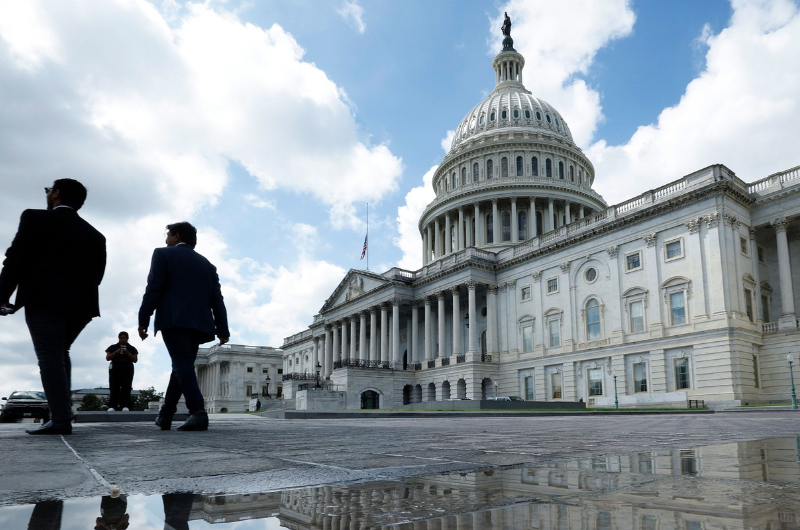As credit unions field questions about a potential U.S. government shutdown if a budget deal is not reached in Washington, D.C. by Saturday (September 30), the California and Nevada Credit Union Leagues have provided talking points for your frontline staff and member-facing materials.
The Leagues also know that credit unions are preparing programs and products to support members, as well as communication and messaging efforts. These materials include answers and facts on the following:
- What is a Government Shutdown?
- Why Do Government Shutdowns Matter?
- Impact to Credit Unions and Their Members.
- Will Federal Employees be Paid?
- Find the Impact of a Government Shutdown to Your Credit Union.
- Impact to Federal Agencies that Credit Unions Work With.
- Impact to Government Programs that May Impact Credit Union Members.
- Economic Impact of Shutdown; Plus Previous Shutdowns.
Please be prepared as the Leagues continue monitoring the situation on Capitol Hill and keep you informed on important updates.
The following are the talking points:
What is a U.S. Government Shutdown?
- The federal government manages its budget on fiscal years (FY) that begin on October 1 and end on September 30.
- Each year, Congress votes on 12 appropriations bills that authorize federal agencies to “cut checks” for federal programs.
- The spending bills must be passed by Congress and signed by President Biden before October 1 to prevent a government shutdown.
- If the government shuts down, discretionary federal programs will go unfunded until a government spending bill is signed into law.
- Of the 12 spending bills, Congress has not passed a single bill in both chambers. You can track the progress of spending bills here.
- Funding through the appropriations process covers 27 percent of the federal budget.
- Remaining federal programs are considered “mandatory” and are automatically funded, despite a government shutdown.
- Potential Solution: To avoid a shutdown, the Senate is working on a continuing resolution (CR), which is a way to keep the government funded when a budget agreement cannot be reached by the deadline. This measure would have to be passed by the House, the Senate, and then signed by President Biden by Sept 30 to avoid a government shutdown. The rumor is the CR would extend the budget through November 17, though that date is not set in stone.
Why Do U.S. Government Shutdowns Matter?
Impact to Credit Unions and Their Members
- Government shutdowns mean that some federal employees will go unpaid. It also means that beneficiaries of federal social programs experience interrupted services.
- If the government shuts down, some credit union members may not receive paychecks.
- In California, there are 142,038 federal employees.
- In Nevada, there are 12,923 federal employees.
Will Federal Employees be Paid?
- When checks have been delayed due to a government shutdown in the past, furloughed employees did receive backpay.
- Some employees will be required to return to work without pay.
- In 2019, the Government Employee Fair Treatment Act was signed into law. This law requires employees of federal agencies to receive backpay in the event of a government shutdown.
- Approximately 65 percent of employees will continue to work during the shutdown because they provide a service deemed “essential” by the federal government, exempting them from being furloughed.
Find the Impact of a Government Shutdown to Your Credit Union
- Want to determine how many federal employees may be affected in your credit union’s service area?
- Here is a link to a study from the Congressional Research Service (CRS) that outlines the number of federal employees per congressional district.
- Are you wondering which congressional districts your branches are in? Please use this tool. Just input the branch’s zip code and find the appropriate congressional district.
- Cross reference the congressional district in the “Find Your Representative” tool with the CRS article to get an estimate of the federal employees in your credit union’s service area.
Impact to Federal Agencies that Credit Unions Work With
The following agencies are not subject to the appropriations process and will remain open:
- National Credit Union Administration (NCUA) will continue to insure deposits up to $250,000.
- Federal Reserve.
- Consumer Financial Protection Bureau (CFPB).
Impact to Government Programs that May Impact Credit Union Members
During a government shutdown, certain social programs may be affected. Here are some programs that credit union members may ask about:
- Social Security: Social security checks will be mailed out and payments will continue. However, 15 percent of the agency may be furloughed, slowing down some services such as benefit verifications.
- Medicaid/Medicare: Medical benefits offered through these programs should not be impacted and payments will continue to be made to medical professionals. However, the department that oversees this program, Health and Human Services, is expected to furlough 42 percent of staff. This may slow access to other programs, such as grant programs.
- Veterans Affairs Benefits: Disability compensation, pensions, education, housing assistance, burials at veterans’ cemeteries and medical care at medical facilities would continue. However, some local veteran affairs offices may close.
- U.S. Post Office: The Post Office will continue to operate with uninterrupted services.
- Air Travel: Transportation Security Administration (TSA) agents at airports will continue to work, but may go without pay. The same is true for air traffic controllers. Expect longer lines at the airport during a government shutdown.
- Federal Student Loans: Student loan payments are scheduled to resume during the government shutdown on Oct. 1. Students must repay loans. Federal programs that make payments, such as Pell Grants and Federal Direct Student Loans, would continue for a limited amount of time, but may experience disruption depending on the length of the government shutdown.
- Department of Labor: Most employees would be furloughed, which may delay labor disputes with auto workers. This may also impact employees that produce reports for the Bureau of Labor Statistics, which may be delayed during a shutdown (auto workers and majority furlough).
- National Flood Insurance: This agency will not have authority to process loans during the shutdown (from the Credit Union National Association).
- U.S. Small Business Administration: It is unlikely that the SBA will be able to process loans during a government shutdown (from the Credit Union National Association).
- Internal Revenue Service: Those who were granted a six-month extension will still need to pay on time, even if the government is shut down.
Economic Impact of Shutdown; Plus Previous Shutdowns
Government shutdowns can have significant economic consequences, primarily affecting federal workers, consumer purchases, and overall economic activity. Here was the impact of previous shutdowns:
- 2013: 16-day government shutdown across all agencies. It is estimated the shutdown took $24 billion out of the economy. Furloughing 850,000 individuals resulted in approximately $2 billion in lost productivity. Additionally, consumer and business confidence fell, leading to reduced spending and investments (from the Credit Union National Association).
According to projections from Goldman Sachs, a government shutdown will reduce economic growth by 0.2 percent for every week the shutdown is in effect.


